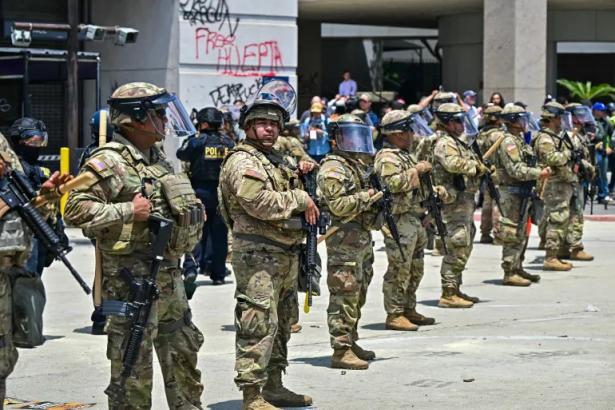I was born in Los Angeles. My mother was born here. Her father and grandfather were born here. Four generations of my family have called this city home. We are Los Angeles.
And now I see soldiers on our streets. ICE vans in our neighborhoods. Federal agents in unmarked cars are seizing citizens and activists in broad daylight. Marines and the National Guard deployed not to protect, but to control. The city that raised me—this dazzling, sprawling place of freedom and invention—is under siege.
Los Angeles has always been more than a city. It is the great experiment of America itself: the most diverse county in the nation, home to immigrants from every corner of the world, more than 200 languages spoken on its streets, one of the largest LGBTQ+ communities in the country. Its economy is vast, its cultural power unmatched. It is a place where reinvention has always been possible—where anyone, no matter their past, can become someone new.
“When whole neighborhoods live in fear of masked agents—it is no longer policing. It is the machinery of authoritarianism grinding into place.”
That freedom is now being choked. When citizens are “disappeared” into unmarked vans, when a nurse monitoring ICE raids is dragged away without rights read, when a teenager is seized walking his dog, when whole neighborhoods live in fear of masked agents—it is no longer policing. It is the machinery of authoritarianism grinding into place.
The poet and prophet James Baldwin warned us long ago:
“Not everything that is faced can be changed, but nothing can be changed until it is faced.”
What we are facing now in Los Angeles is not simply a crisis of law enforcement. It is a crisis of democracy. Because if the most diverse city in America, the living embodiment of freedom and reinvention, can be occupied and silenced, then no city in this country is safe.
Brian Wilson once described the “California ethos”: a place where no one is in your business, where everyone is free to follow their own choices. Joan Didion wrote that Los Angeles is “a place that belongs forever to whoever claims it hardest, remembers it most obsessively, loves it so radically that he remakes it in his image.”
For generations, my family has claimed Los Angeles in that way. We have loved it radically. But today, the image being remade is not freedom—it is fear.
Ice-T put it plainly: “Los Angeles is a microcosm of the United States. If L.A. falls, the country falls.”
That is the truth we must face. The occupation of Los Angeles is not a local story. It is the rehearsal of a national tragedy.
But this city has a history of resistance. From Zoot Suiters who refused to be erased, to Chicano students who walked out demanding education, to the countless organizers who built solidarity across languages, colors, and neighborhoods—Los Angeles has never accepted silence. We cannot start now.
Los Angeles must resist. Not only for itself, but for America. For all that this country claims to stand for—freedom, equality, and the right to be. If democracy is to survive, it must be defended where it is most under attack. And today, that place is here.
Max Benavidez, PhD, is the author of several books, including Gronk, the definitive study of the Los Angeles artist, and was the first art critic to bring the avant-garde Chicano collective Asco into the mainstream. He has been an art critic and essayist for The Los Angeles Times and a longtime contributor to The Huffington Post and Bomb magazine in New York City.


Spread the word